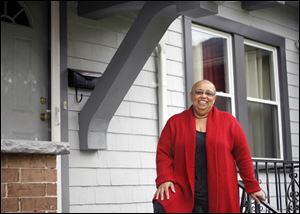
REAL ESTATE
Home Work: Education can help first-time buyers avoid mistakes
10/19/2013
First time buyer Gilda Coleman stands on the porch of her new home.
Even though the housing market is subject to the economy’s highs and lows, for a lot of Americans like Toledoan Gilda Coleman, this has been a good time to buy a first home.
“My job is pretty good, but I questioned whether I could afford it,” said Ms. Coleman, 58, a routing coordinator for Toledo Public Schools.
She took the plunge last year after finding a house that seemed to be calling her name.
“Everything pertaining to buying a house was amazing,” she said. “Sometimes people say they just up and bought a house. But that doesn’t work for everyone.”
Nationally, homes sold to first-time buyers accounted for 28 percent of total sales in August, compared to 31 percent in August, 2012, according to the National Association of Realtors.
When Ms. Coleman wanted to consider buying a home, she got in touch with NeighborWorks Toledo Region for help. The organization uses educational sessions to address issues such as making down payments, obtaining financing through conventional or governmental loans, and establishing a good credit rating..
“The vision is to educate and ready individuals who have the desire for home ownership, and oftentimes the results are not immediate,” said Alma Dortch-Gilbert, home ownership center manager at NeighborWorks, which is part of a national network. “There is a client in particular who began in 1997 working on their credit and it was in 2002 that they were able to purchase a home. That speaks to your longevity and the perseverance needed if you want to become a homeowner.”
Tom Walker, operations manager in the Ohio Housing Finance Agency in Columbus, discourages first-timers from jumping into a home search without first getting home-buying and home ownership counseling, which covers seemingly mundane topics of home maintenance and household budgeting.
He said his office requires buyers to have a minimum credit score of 640, a number that every potential buyer should know.
“A lot of them don’t know what their score is until they apply for a loan. We urge them to find out that information,” he said, adding that a poor credit history can make it difficult or impossible to qualify for a mortgage.
Ms. Coleman said she had some financial challenges that hurt her credit rating.
But she added, “If your credit is going the wrong way for a while, you have to get that straightened [out].”
Ms. Dortch-Gilbert said that among the weightiest credit setbacks are medical bills, student loans, and misuse of credit.
“You have to reckon with it further down the line when your heart’s desire is to become a homeowner,” she said. “The gist of it all is that we educate people for lasting home ownership.”
Consumers can annually obtain a free credit report three ways, according to the Web site credit.com: Online at www.annualcreditreport.com, by telephone at 1-877-322-8228, or by requesting a written report from Annual Credit Report Request Service, P.O. Box 105281, Atlanta, GA, 30348-5281.
Counseling from a home finance agency is beneficial, Mr. Walker said. Some offer eight-hour classes that address buying, maintenance, budgeting, and remodeling. In the state program, potential buyers cannot close on a loan unless they have completed an education course, Mr. Walker said.
NeighborWorks offers such a course online.
Mr. Walker said first-timers should talk with a lender to get pre-qualified. Knowing how much one is able to borrow can narrow the search and may give the buyer an idea how much the monthly mortgage payments would be.
“People have a tendency to look at what looks pretty. They are not looking at the functionality of the furnace, hot water tank, roof. If it’s cute, they like it. But home inspections might show the furnace is not sparking like it should or the life of the roof is [minimal],” said Ms. Dortch-Gilbert.
Those details bring house hunters back to reality. It’s a good idea for all buyers — not just first-timers — to have a house inspected if they are seriously interested in buying it. The cost can range from a few hundred dollars to as much as $600, Mr. Walker said.
“An inspector goes through a house and lists everything wrong, no matter how minor or major,” he said.
Depending on the results, the buyer may be able to use the findings to negotiate with the seller for repairs or a reduced price. If the seller refuses, the buyer can likely bail out of the contract, he said.
“Though [buyers] could stay, they would have to work that out with their lender who looks at those repairs. If they are substantial, that might jeopardize the loan,” Mr. Walker added.
At the closing on a house, most Ohio lenders take time to do a lot of explaining.
“But they explain at their level and not at the lenders’ level,” Mr. Walker said. “Lenders tell us it takes a longer time to deal with first-timers because they are also educating them. They must be willing to learn and listen to what’s being shared with them.”
Though home sales typically are slow this time of year, Mr. Walker said he’s confident they will pick up again in March.
“We are definitely a lot better off this year than last year,” he said. As far as first-timers, they are “out there starting to get homes again.”
Contact Rose Russell at: rrussell@theblade.com or 419-724-6178.